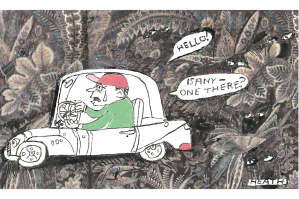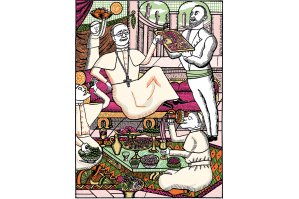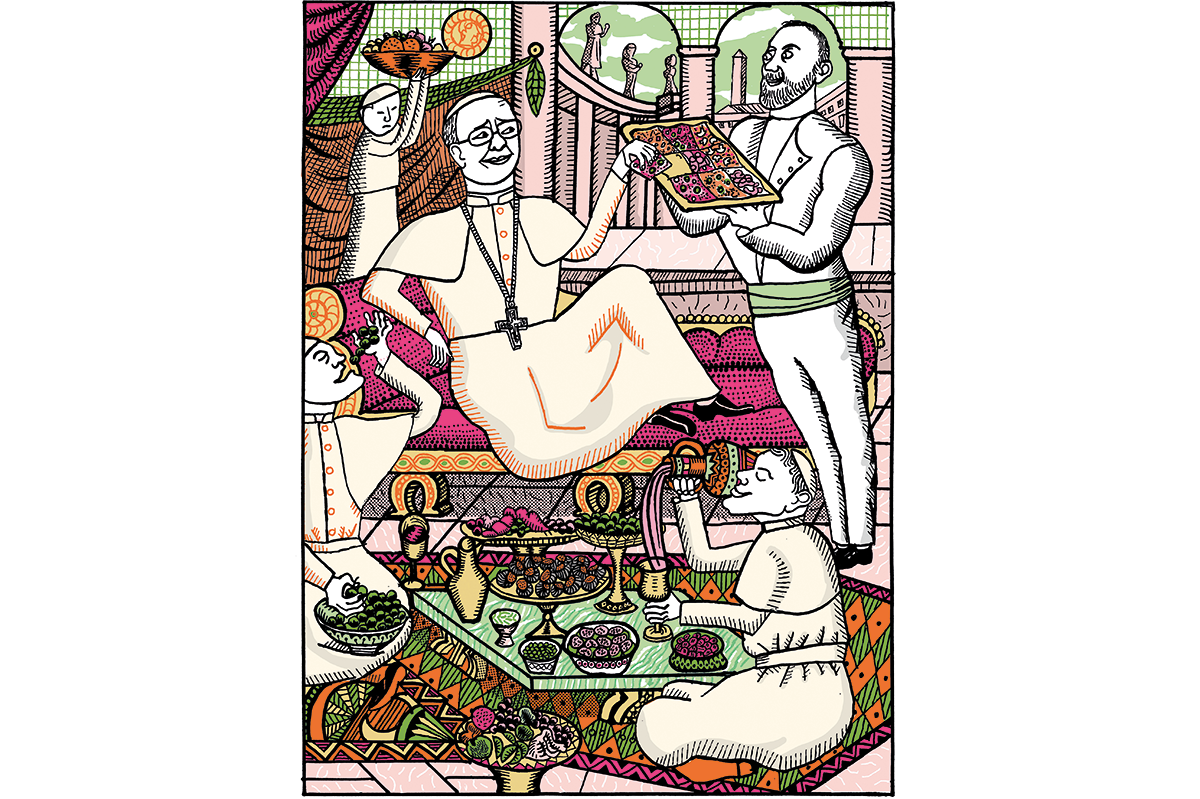Rebecca Illing’s résumé doesn’t read like your typical hotelier’s: circus school graduate, free diver, marine conservation advocate and certified death doula. So when the thirty-seven-year-old Londoner inherited a rundown guest house in Portugal’s northerly Minho region, the property was destined to be reimagined as something more than a straightforward B&B.
Illing had spent childhood summers at Paço da Glória, roaming its cork oak woodlands and swimming in the nearby Lima River. But the circumstances of her return in 2020 were less idyllic. Europe was entering lockdown, and she was grieving the sudden death of her brother. Illing went to ground on the 200-year-old estate, with her artist partner Richie Culver and their young children in tow, and the lushly verdant Val de Lima provided solace and a purpose beyond simply renovating the manor house — an eclectic mash-up of baroque and neogothic architecture.
“I really fell for this place again and started to make these connections back to my family — like how my father had poured his grief into gardening after my mother died. I saw its potential as a retreat and community space.” Particularly retreats for people who, like her, were dealing with loss.
If walls could talk, Paço da Glória’s would have some wild tales to tell. Secluded among vinho verde vineyards, the estate was once a favored spot for politicos and aristocrats to let down their hair. A hundred years ago, its owners were a transatlantic power couple: Elizabeth Stetson, widow of the cowboy-hat tycoon, and the Count of Santa Eulália, a blue-blooded diplomat-cum-sculptor. Lord Peter Pitt Millward, a descendant of British prime minister William Pitt, snapped the property up at auction in 1932 and bequeathed it in turn to My Week with Marilyn author Colin Clark.
Letters recently unearthed in the cob-webbed corners of the manor hint at money-laundering schemes and debauched pool parties which, today, would probably be enough to get the participants canceled. “The house has definitely had a colorful past and seen some scandalous behavior,” reflects Illing. “I think of it as the house lost its way and now it’s finding its path again.”
The palacio’s new path involves swapping excess for altruism, hedonism for healing. No longer a frivolous folly or batten-down-the-hatches private home, Paço da Glória is being reborn as one of Europe’s hottest wellness retreats.
Still present are the hallmarks of any self-respecting, old-world country home: the tennis courts and tapestry-lined galleries, a golden Labrador dozing by the fireplace and scantily clad classical statues peeping from alcoves. But look closer and you’ll find change creeping in through the ivy-clad stones. Marble busts and antique furniture sit beside contemporary sculptures by Illing’s partner Culver, who’s also responsible for the estate’s revamped, hand-drawn coat-of-arms. A former stable block has been converted into seven guest suites — chicly minimalist with their rainfall showers and raw granite feature walls — and a communal kitchen where private chef Lucy Varanda turns produce from the manor’s biodynamic vegetable plot into mouth-watering shared platters (think handmade gnocchi dressed in zucchini flowers, and radicchio with sheep’s ricotta).
Illing uses the phrase “wellness retreat” cautiously, acknowledging its use ad nauseam by big brands as well as its undertones of privilege and self-indulgence — it’s the sort of thing that gets sent up in HBO’s dark satire The White Lotus. So, how will Paço da Glória do things differently? Sure, there will still be rich white people practicing sun salutations on its newly built yoga deck and doing laps in the saltwater infinity pool. And yes, the place can be hired out as a luxurious private villa for a “normal” vacation. But this is not the estate’s raison d’être.
During the off-season, Illing plans to throw open the doors for community workshops, talks and festivals, and a “pay-what-you-can” pricing structure will make retreats accessible to more than the 1 percent. Artist residences are about to get underway; one of the towers has been converted into a studio and living quarters to host up-and-coming writers, photographers or performers for free. “We don’t want it to just be this luxury exclusive space,” Illing insists, “but also make it affordable and inclusive to local people. I see it being a sort of think tank for creatives who maybe feel burnt out and would find our sur- roundings inspiring.”
Inspiring they are. The Val de Lima is an oddly overlooked corner of Portugal, despite being only an hour’s drive from Porto. It’s a lushly verdant contrast to the country’s sunbaked south, with morning mists pooling in valleys of ancient cork oaks, fern-fringed riverbanks and family-run vineyards — all of which can be surveyed from Paço da Glória’s lofty hilltop. The manor’s glowering granite architecture begs to be captured in charcoal or on film, while the gardens would be a gift for any oil painter: daubs of lead yellow for those absurdly large lemons weighing down the branches, swirls of bright blue for the blooming hydrangeas and agapanthus. As Illing gathers wildflowers to decorate the dinner table, her white linen clothing stands out in sharp contrast against the sunlit green: it could be a Monet or Renoir canvas.
Beyond the manicured front lawn, much of the grounds remain untamed. Mushrooms pop up between gnarled tree trunks and ivy cloaks crumbling outbuildings. Sun-dappled woodlands are fragrant with mint. Walking along these overgrown pathways, beyond the citrus groves and chicken coop, we come to a walled garden. It’s a peaceful place with moss-covered stone and a firepit in the center, with talismans made by Illing’s three children hanging from the tree branches. “This,” she announces, “is the Death Garden,” so-called not only because her mother’s and brother’s ashes were scattered there, but for its role in the most intriguing aspect of Paço da Glória’s wellness offerings: grief retreats.
After her own bereavements, Illing trained as a death doula — essentially, as a supporter for people navigating the death of loved ones, much like a midwife supports new mothers navigating birth. She knows first-hand how isolating grief can be, the difficulty in finding the right words to talk about loss, let alone having meaningful ways to commemorate loved ones in an increasingly secular society. “I’ve traveled all my life and studied anthropology, which made me realize that in the West, we often really shy away from talking about death,” she reflects.
Through a combination of one-on-one counseling and group activities, “griefcations” can help topple some of those taboos. The first, in October 2024, will be led by Canadian psychotherapist Andrea Warnick; it’s designed specifically for families with children. For a lighter-touch alternative to a full-blown retreat, there’s the Last Supper — a supper club series where it’s not considered bad manners to broach the topic of death at the dining table. “We might also take a walk through the land, maybe pick something that reminds you of that person you’re grieving for and create a kind of collective shrine,” Illing explains. As for the Death Garden, “I see this being a ceremonial space. Imagine coming here at night and there are candles and the firepit’s burning and people can just exchange memories.”
It’s a refreshing retort to the longevity-obsessed, good-vibes-only side of the wellness industry. And while mortality might not seem like fodder for a jolly vacation, these rituals needn’t be dour. Case in point: Illing takes her kids wakeboarding on the anniversary of her brother’s death, sharing an activity he loved with the next generation. The mood is more cathartic than macabre. “It’s about remembering them in ways that feel right.” She gestures at the Minho countryside, where the vine leaves are already turning tawny and grapes hang low with sugar. In time they’ll be laced with frost before shaking back to life in green starbursts next spring. “This space, the land has taught me to deal with my losses, so now I’m hoping it can do the same for others.”
This article was originally published in The Spectator’s January 2024 World edition.


























Leave a Reply